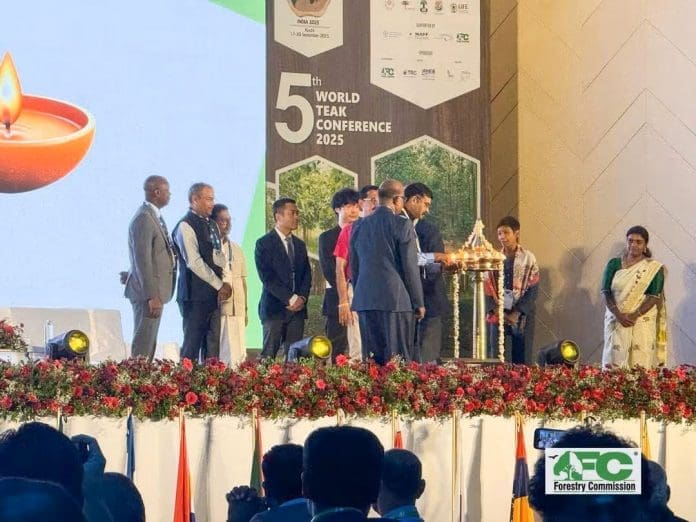Ghana was prominently represented at the 5th World Teak Congress held in Kochi, India, from September 17-20, 2025, with Forestry Commission Chief Executive Dr. Hugh C.A. Brown leading a delegation that highlighted the country’s groundbreaking achievements in sustainable forest governance.
The four-day international conference, themed “Sustainable Development of the Global Teak Sector – Adapting to Future Markets and Environments,” brought together delegates from 40 countries, including farmers, researchers, academics, policymakers, and forestry institutions.
Dr. Brown, who serves as Chairman of both the Scientific Organizing Committee and TEAKNET, the international network of teak stakeholders, delivered opening ceremony remarks highlighting Ghana’s significant progress in forest governance and timber exports.
TEAKNET operates as the primary conference organizer, providing a platform for growers, traders, researchers, and other stakeholders with interests in teak development and sustainable management practices globally.
The congress marked the first time India has hosted the prestigious World Teak Conference, with previous editions held in Costa Rica (2011), Myanmar (2013), Ecuador (2019), and Ghana (2022).
Dr. Brown used the platform to announce Ghana’s historic achievement on August 15, 2025, when the country became the first African nation and second globally, after Indonesia, to issue a Forest Law Enforcement, Governance and Trade (FLEGT) license for European Union-bound timber exports.
The FLEGT licensing system, underpinned by Ghana’s Timber Legality Assurance System (GhLAS), certifies that all timber exports to the EU and other destinations, including India, originate from legally sourced and responsibly managed forests.
This milestone culminated a 16-year journey to strengthen forest governance and ensure timber legality, with Ghana’s FLEGT-licensed timber entering European markets on October 8, 2025, providing seamless access without additional due diligence checks.
The Forestry Commission CEO emphasized how collaborative efforts across the teak value chain have contributed to Ghana’s development, providing thousands of jobs, sustaining rural livelihoods, and forming significant portions of timber exports while supporting climate mitigation strategies.
Dr. Brown described TEAKNET’s role as “a bridge linking local experiences to global dialogues, ensuring that knowledge flows both ways; from field to policy, and from research to practice.”
The congress sessions were designed to generate knowledge, translate science into solutions, transform research into practice, and convert dialogue into collective action for sustainable teak sector development.
Ghana’s delegation mounted an exhibition stand showcasing the Forestry Commission’s work and displaying handcrafted artifacts made from Ghana teak, which attracted numerous visitors throughout the conference period.
The achievement represents a significant milestone for African forest governance, with Ghana demonstrating leadership in implementing international timber legality standards while maintaining economic viability for forest-dependent communities.
Products covered by FLEGT licenses automatically comply with EU Timber Regulation requirements, ensuring that Ghanaian timber meets stringent environmental and legal standards demanded by European markets.
The licensing system addresses growing global concerns about illegal logging and associated trade, positioning Ghana as a responsible timber exporter committed to sustainable forest management practices.
Ghana’s success in implementing the FLEGT licensing scheme provides a model for other African timber-producing countries seeking to access European markets while meeting international legality requirements.
The World Teak Congress provided an opportunity for Ghana to share experiences and best practices in forest governance while learning from other teak-producing countries about sustainable management techniques and market adaptation strategies.
Dr. Brown’s leadership roles in both the Scientific Organizing Committee and TEAKNET underscore Ghana’s growing influence in international forestry circles and commitment to sustainable teak development globally.
The congress emphasized the importance of adapting to future markets and environments, with discussions focusing on climate change adaptation, sustainable management practices, and emerging market opportunities for teak products.
Ghana’s participation reflects the country’s commitment to international cooperation in forestry development while positioning itself as a leader in sustainable timber production and forest governance across Africa.
The conference provided networking opportunities for Ghana’s forestry sector to engage with international partners, potential investors, and technology providers interested in sustainable teak development and value addition.
Source: newsghana.com.gh











